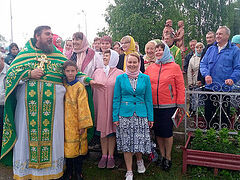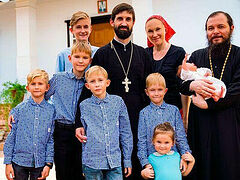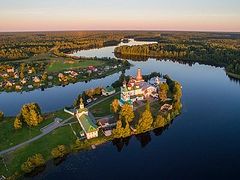“Fresh air, nature, beautiful views, no bustle, serenity and friendly people around—what else do you need for happiness? Rural life is a fairy-tale, especially if you are a priest,” as many believe.
Thanks to our trip to Russia’s north as part of the “Native Land” volunteer youth project of the Moscow Sretensky Monastery I met Fr. John Pogorelov, rector of the Church of Monk-Martyr Benjamin (Kononov) of the Monastery of St. Anthony of Siya, situated in the village of Brin-Navolok, Arkhangelsk region. We became friends and after my return to Moscow we began to correspond. My impressions of what I had seen during the expedition were so great that I decided to ask Fr. John questions about his life in this remote part of our country, and thus this article came about.
Is country life really so attractive to the clergy, and if so, why? Fr. John hails from the northern capital of our country—St. Petersburg. He graduated from the St. Petersburg Theological Seminary, after which he moved to Arkhangelsk, where he was ordained. This was the beginning of his fascinating story in the North.
“My journey to Brin-Navolok passed first through the big city, then two years of service in a smaller city, and then, providentially, I ended up here. Thus, the Lord gradually prepared me for ministry and village life,” Priest John Pogorelov relates.
After graduating from the seminary and living in Moscow, the priest was invited to go to Arkhangelsk, and he agreed voluntarily, knowing absolutely nothing about this city and its way of life.
 “Of course, my wife and I worried, because we were taking a step into the unknown. But I decided to go to the outback because I really wanted to understand how ordinary people lived away from the capital. At that time I believed that Arkhangelsk was the very back of beyond. I didn’t know about Brin-Navolok back then,” the priest smiles.
“Of course, my wife and I worried, because we were taking a step into the unknown. But I decided to go to the outback because I really wanted to understand how ordinary people lived away from the capital. At that time I believed that Arkhangelsk was the very back of beyond. I didn’t know about Brin-Navolok back then,” the priest smiles.
HIs ministry in Arkhangelsk differed from what Fr. John had experienced in St. Petersburg.
“A big city, where you have a full-fledged parish, financial assistance and other benefits, makes you forget about all the difficulties of life. However, when you move to a remote area, you begin to think about the spiritual realm more than about the material,” the priest admits.
In Arkhangelsk there was a very significant event in the priest’s life—his ordination as deacon.
“That day I was moved to tears and experienced an indescribable feeling. I felt like a neophyte again; there was a sincere desire to pray very fervently and strive for holiness (then they explained to me that many priests have the same feeling after ordination), and I still remember it...”
After three years in Arkhangelsk, the unpredictable and scary life in a village awaited Fr. John and his wife Taisia, about which they had known nothing at all.
“On arriving in Bryn-Navolok, we were immediately shown the church where I was supposed to serve. Of course, at first glance, this place could not be called a church. It was a small building, more like a house. There was nothing on it that indicated its true purpose. We were very surprised and began to worry very much,” Fr. John recalls.
The priest’s family was met by only two parishioners: Svetlana Pavlovna and Alevtina Vasilyevna—they also told the priest that the parish consisted of five or six people:
“When my wife and I heard this, we were seized with fear—we had not expected that after living in St. Petersburg, Moscow and Arkhangelsk we would face problems of such a scale...”
It is not scary to live in a village and to be the rector of a church, but to live in a village and to be the rector of a church that in the Soviet era used to be an office, and the current parishioners are its former employees, is not an easy task.
“Many of these parishioners still cannot get over themselves and come to this church for services simply because their past does not give them peace.”
Of course, there was no question of any income from the parish: “Father, we don’t have money, but you won’t go hungry!” These were the first words of the Brin–Navolok woman parishioners.
“When I asked where my wife and I would live, they told us that this ‘church-office’ had as many as four cells, a kitchen and even a large refectory: ‘Choose any cell and live there!’ No wonder we were frightened...”
No more than five parishioners attended services even on the great feasts. The living conditions were poor: The old floor was shaky, it was heating by a woods stove, and instead of a church there was a room designated for services, with no altar or many other necessary things.
“Then we gave way to despair, not understanding how to live on. We even wanted to be transferred to another place, but after a while humility came, and we put everything into the hands of the Lord. Over time, I realized that the Lord directs us where we are needed most—He sees everything; the Lord is our Physician, and we are His instruments. The clergy of parishes are not changed by their metropolitans, as many think, but by the Lord. Only He knows when a parish needs a new ‘instrument’. I understood that the Lord never abandons those who pray and sincerely communicate with Him: He always visits, hears and helps them at the right time. In an unexpected and always surprising way people began to appear in my life and the life of the parish, from whom help came at the most necessary moments.”
Over time, the parish began to grow, and Fr. John and his wife did everything in their power to inspire people to come and pray:
 “The Lord tests us all. He wants us to inherit the Heavenly Kingdom, and if we only sit on a sofa comfortably and do nothing, how will we attain it?”
“The Lord tests us all. He wants us to inherit the Heavenly Kingdom, and if we only sit on a sofa comfortably and do nothing, how will we attain it?”
The church began to look different. The old iconostasis was restored, some new icons appeared, among which is the main church icon of the Venerable Martyr Benjamin, painted using the donation of a caring person. At the request of our parishioners a real candle stand appeared in the church (parishioners used to put candles in sand). Taisia became the choir director and arranged singing practice for the parishioners. Although there are no professionals in the choir, hymns sound warm and pure in a homey manner.
Soon they began to thank the priest for his efforts and care for the parish:
“The parishioners said, ‘Like teacher, like pupil.’ Of course, this saying is partly true, but I am sure that everything began to develop in this way only thanks to God and the parishioners themselves. It is they who bring warmth and coziness to this parish, labor and pray together with us. I have never sought to draw people to myself, but I have sought to convert them to God.”
Here are the words that Fr. John said to the parishioners in his first sermon: “You and I must become one united family, one whole, one flock before God, and this is my goal.”
And so it is indeed. Observing communication between the priest and the parishioners, I saw affection, support and understanding on both sides; they really were members of one family, and the “former office” turned into a church where two or three are gathered together in the name of Christ (cf. Mt. 18:20).
Now Fr. John has a difficult task—to build a new church on the site of the “church-office”. The task is really difficult and time-consuming, requiring a lot of time, effort and money. However, the priest is not discouraged:
“Many a little makes a mickle, and many a log makes a church for Brin-Navolok.”
I believe that the Lord will not abandon Fr. John in such a good undertaking and in a few years the domes of the new church will shine over the village.
I want to conclude my story with Fr. John’s words:
“When a young man enters seminary, he must understand from the very beginning that he can be sent to any God-forsaken hole, and he must be prepared to know that he will not only have to be guided by literature and knowledge that he was taught at the seminary, but also work with his hands.”







